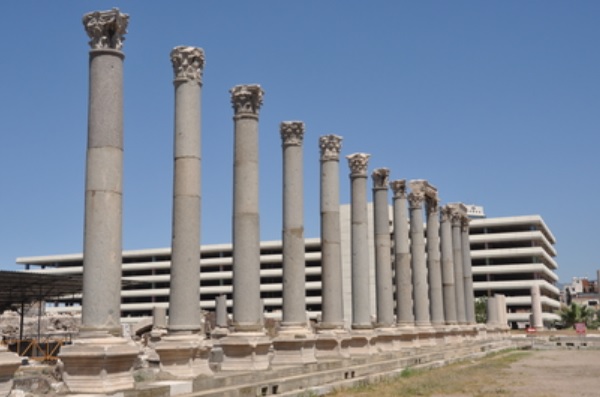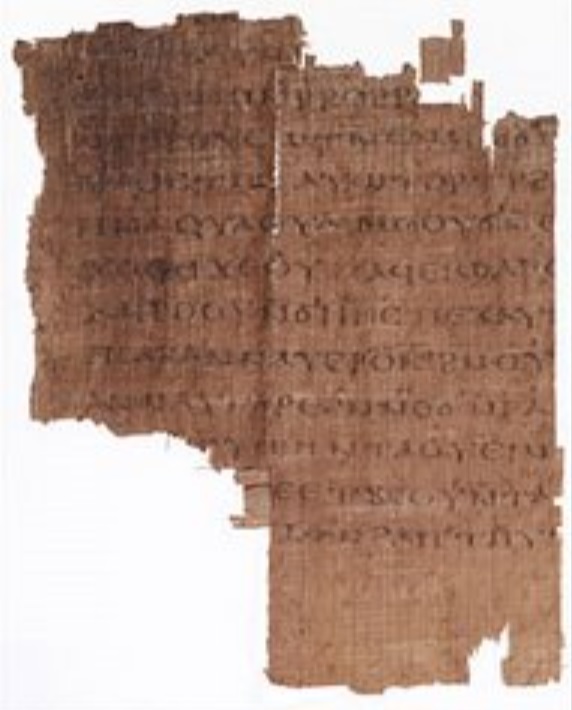“Go therefore and make disciples of all the nations…teaching them to observe all that I commanded you; and lo, I am with you always, even to the end of the age” (Matthew 28:19-20, NASB).
——————–
Contents:
1) Smyrna (Mike Willis)
2) The Flesh (Heath Rogers)
3) Sword Tips #24 (Joe R. Price)
——————–

-1-
Smyrna
Mike Willis
Smyrna is located on the western coast of Turkey in a natural harbor of the Aegean Sea, into which flows the Hermus River. Known today as modern Izmir, the ancient city of Smyrna has not and cannot be well excavated because so much of it lies beneath the modern city. The city was first settled in the 10th century B.C. (contemporary with King Solomon). That area is known as “old Smyrna” and it has been excavated.
Smyrna came into conflict with the emerging Lydian kingdom and was destroyed in about 600 B.C. The inhabitants scattered to surrounding villages. In 334 B.C., when Alexander the Great invaded the area, he refounded the city in its present location. King Lysimachus put the city on the map after his reorganization of Asia Minor, following the battle of Ipsus (301 B.C.).
Ancient Smyrna competed for trade with Ephesus and eventually became the leading trading center of the area. Some ancient coins called Smyrna the “first of Asia,” though this was contested, according to the coins of Pergamum and Ephesus (Ramsay, 1909, 255). Strabo called it the most beautiful of all cities (Blaiklock, 1983, 418). Smyrna boasted that it was the city of the famed Greek author Homer, who wrote the Iliad and the Odyssey. Even today, Izmir is one of the largest and busiest commercial centers in the region.
William Ramsay writes, “As early as 195, when Antiochus was still at the height of his power, Smyrna built a temple and instituted worship of Rome; this bold step was a pledge of uncompromising adherence to the cause of Rome, while its fortunes were still uncertain” (1909, 254).
The town is only mentioned two times in Scripture (Rev. 1:11; 2:8). The church at Smyrna may have been established during the period that Paul preached in Ephesus and all Asia heard the gospel (Acts 19:10). There may be an allusion to ancient practices in the “crown of life” expression in Revelation 2:10. “Ancient writers often referred to the ‘crown of Smyrna,’ which perhaps referred to a crown of flowers worn by worshipers of the goddess Cybele” (Blaiklock, 1983, 418). However, Ramsay believes the “crown of Smyrna” “arose from the appearance of the hill Pagos, with the stately buildings on its rounded top and the city spreading down its rounded sloping sides” (1909, 256). Ramsay continues to write about the “crown” of Smyrna saying,
The comparison of Smyrna to a flower has a close connection with the “crown.” The crown or garland was usually a circlet of flowers; and the mention of a crown immediately aroused in the ancient mind the thought of a flower. Crowns were worn chiefly in the worship of gods. The worshipper was expected to have on his head a garland of the flowers or foliage sacred to the god whose rites he was performing. The guests at an entertainment were often regarded as worshippers of Bacchus and wore the sacred ivy: frequently, also, the entertainment was a feast connecting with the ritual of some other deity, and the crown varied accordingly. Thus the ideas of the flower and the crown suggest in their turn the idea of the god with whose worship they were connected, i.e., the statue of the god. The tutelary deity of Smyrna was the Mother-goddess, Cybele; and when Aristides pictured Smyrna as a statute sitting with her feet on the sea, and her head rising to heaven and crowned with a circlet of beautiful buildings, he had in mind the patroness and guardian of the city, who was represented enthroned and wearing a crown of battlements and towers (1909, 258).
Whether or not Ramsay is correct about his interpretation of the “crown,” the coins from Smyrna show the mother-goddess Cybele adorned with a “crown.”
The letter in Revelation indicates that there was at least one (perhaps more) Jewish synagogue in the city. “I know thy works, and tribulation, and poverty, (but thou art rich) and I know the blasphemy of them which say they are Jews, and are not, but are the synagogue of Satan” (Rev. 2:9). Most probably the animosity of the Jews toward Christians was stirred by the conversion to Christ of many Jews and God-fearing Gentiles (see Acts 10:1-2, Cornelius; the term “God-fearer” is a technical term for Gentiles who attended the synagogue but were not fully converted to Judaism).
The text also indicates that saints in Smyrna would suffer persecution, even to the point of losing their lives. John writes, “Fear none of those things which thou shalt suffer: behold, the devil shall cast some of you into prison, that ye may be tried; and ye shall have tribulation ten days: be thou faithful unto death, and I will give thee a crown of life” (Rev. 2:10). In A.D. 156, the eighty-six-year-old Polycarp was executed at Smyrna along with eleven others from Philadelphia (The Martyrdom of Saint Polycarp, 19). And, although the execution occurred on a Sabbath, the Jews were zealous in lending a hand to gather wood for Polycarp to be burned alive (The Martyrdom of Saint Polycarp, 8, 13).
— Via Truth Magazine, Volume LVI, Number 3, March 2012,
https://www.truthmagazine.com/archives/volume56/2012_03_Mar_Truth_Magazine.pdf
——————–

-2-
The Flesh
Heath Rogers
The New Testament reveals there is a battle waging within every Christian – a battle between the Spirit and the flesh. “I say then: Walk in the Spirit, and you shall not fulfill the lust of the flesh. For the flesh lusts against the Spirit, and the Spirit against the flesh; and these are contrary to one another, so that you do not do the things that you wish” (Gal. 5:16-17).
The flesh in this passage is not our physical body. Flesh is translated from the Greek term sarx which Thayer describes as “mere human nature, the earthly nature of man apart from divine influence, and therefore prone to sin and opposed to God.”
Consider the following facts about the flesh learned from Romans 8:5-8.
5 For those who live according to the flesh set their minds on the things of the flesh, but those who live according to the Spirit, the things of the Spirit.
6 For to be carnally minded is death, but to be spiritually minded is life and peace.
7 Because the carnal mind is enmity against God; for it is not subject to the law of God, nor indeed can be.
8 So then, those who are in the flesh cannot please God.
1. The flesh has appetites or desires (v. 5). Because of this, we can expect the flesh to be highly motivated to satisfy these desires.
2. The flesh is opposed to the Spirit (v. 5). There is no middle ground, no compromise between the two.
3. The consequences of the flesh are death (v. 6). Sin promises pleasure, but it is passing, leaving behind the penalty of death.
4. The flesh is an enemy of God (v. 7). It will always be hostile to the things of God.
5. The flesh is incapable of submitting to the will of God (v. 7). There is no hope of “converting” the flesh. Instead, we are instructed to crucify the flesh with its passion and desires (Gal. 5:24).
6. The flesh renders one incapable of pleasing God (v. 8). We please God by winning this inward battle and producing the Fruit of the Spirit in our lives.
To win this battle, we must set our minds on the things of the Spirit (Rom. 8:5), bringing our thoughts into captivity to the obedience of Christ (2 Cor. 10:5). We must also walk in the Spirit (Gal. 5:16) – actively following the teaching of the Spirit in His word. Doing so will give us an advantage over the flesh and its desires.
— Via Articles from the Knollwood church of Christ, February 2023
——————–

-3-
Sword Tips #24
“I thought about my ways, and turned my feet to Your testimonies. I made haste, and did not delay to keep Your commandments” (Psalm 119:59-60).
Self-examination is crucial to spiritual success. Take a careful look at yourself today by using God’s word as your mirror. Are you living according to God’s will? If not, start obeying God’s commandments without delay.
If you put off obeying God your heart becomes calloused, making it harder to choose what is right.
Make today the day you turn away from sin and swiftly run to God.
– Joe R. Price
——————–
The Steps That Lead to Eternal Salvation
1) Hear the gospel — for that is how faith comes (Rom. 10:17; John 20:30-31).
2) Believe in the deity of Jesus Christ, the Son of God (John 8:24; John 3:18).
3) Repent of sins. For every accountable person has sinned (Romans 3:23; Romans 3:10), which causes one to be spiritually dead (Ephesians 2:1) and separated from God (Isaiah 59:1-2; Romans 6:23). Therefore, repentance of sin is necessary (Luke 13:5; Acts 17:30). For whether the sin seems great or small, there will still be the same penalty for either (Matt. 12:36-37; 2 Cor. 5:10) — and even for a lie (Rev. 21:8).
4) Confess faith in Christ (Rom. 10:9-10; Acts 8:36-38).
5) Be baptized in water for the remission of sins (Mark 16:16; Acts 2:38; 22:16; 1 Pet. 3:21). This is the final step that puts one into Christ (Gal. 3:26-27). For from that baptism, one is then raised as a new creature (2 Cor. 5:17), having all sins forgiven and beginning a new life as a Christian (Rom. 6:3-4). For the one being baptized does so “through faith in the working of God” (Col. 2:12). In other words, believing that God will keep His word and forgive after one submits to these necessary steps. And now as a Christian, we then need to…
6) Continue in the faith by living for the Lord; for, if not, salvation can be lost (Matt. 24:13; Heb. 10:36-39; Rev. 2:10; 2 Pet. 2:20-22).
——————–
Tebeau Street
CHURCH OF CHRIST
1402 Tebeau Street, Waycross, GA 31501
Sunday: 9 a.m. Bible Classes and 10 a.m. Worship Service. We also have a Congregational Song Service at 5 p.m. for every first Sunday of the month.
Wednesday: 7 p.m. for Bible Classes
evangelist/editor: Tom Edwards (912) 281-9917
Tom@ThomasTEdwards.com
https://thomastedwards.com/go/all.htm (This is a link to the older version of the Gospel Observer website, but with bulletins going back to March 4, 1990.)




